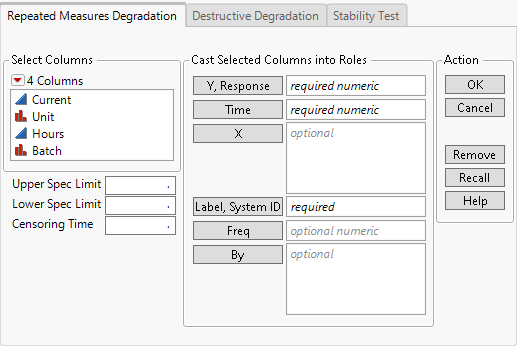Launch the Degradation Platform
Launch the Degradation platform by selecting Analyze > Reliability and Survival > Degradation.
Figure 16.3 The Degradation Launch Window
For more information about the options in the Select Columns red triangle menu, see “Column Filter Menu” in Using JMP.
Analysis Types
The launch window is split into three tabs, representing three different types of analyses:
Repeated Measures Degradation
Performs linear or nonlinear repeated measures degradation analysis. This option allows only one Y, Response variable. It does not allow censoring.
Destructive Degradation
Performs linear or nonlinear destructive degradation analysis. Choose this type of analysis if units are destroyed during the measurement process. This option allows censoring. See Custom Destructive Degradation Models.
Note: The Destructive Degradation platform provides a flexible collection of predefined models for destructive testing. See “Destructive Degradation”.
Stability Test
Performs a stability analysis for setting pharmaceutical product expiration dates. This option allows only one Y, Response variable. See Stability Analysis in the Degradation Platform.
Launch Window Options
The launch window contains the following options:
Y, Response
Identifies the column that contains the degradation measurements.
Time
Identifies the column that contains the time values.
X
(Available only in the Repeated Measures Degradation and Destructive Degradation tabs.) Identifies the explanatory variable. Use this role to specify the accelerating factor in an accelerated degradation model.
Label, System ID
(Available only in the Repeated Measures Degradation and Stability Test tabs.) Identifies the column that contains the unit IDs.
Freq
Identifies a column that contains a frequency for each row.
Censor
(Available only in the Destructive Degradation tab.) Identifies a column that designates if a unit is censored.
By
Identifies a variable to produce an analysis for each level of the variable.
Censor Code
(Available only in the Destructive Degradation tab.) Identifies the value in the Censor column that designates right-censored observations. After a Censor column is selected, JMP attempts to automatically detect the censor code and display it in the box. To change this, click the red triangle and select from a list of values. You can also enter a different value in the box. If the Censor column contains a Value Labels column property, the value labels appear in the list of values. Missing values are excluded from the analysis.
Upper Spec Limit
Specifies an upper specification limit. (This option is required in the Stability Test tab.)
Lower Spec Limit
Specifies a lower specification limit. (This option is required in the Stability Test tab.)
Censoring Time
(Available only in the Repeated Measures Degradation and Destructive Degradation tabs.) Specifies a Time value that represents censoring of pseudo failures when you use Inverse Prediction. See Inverse Prediction.
